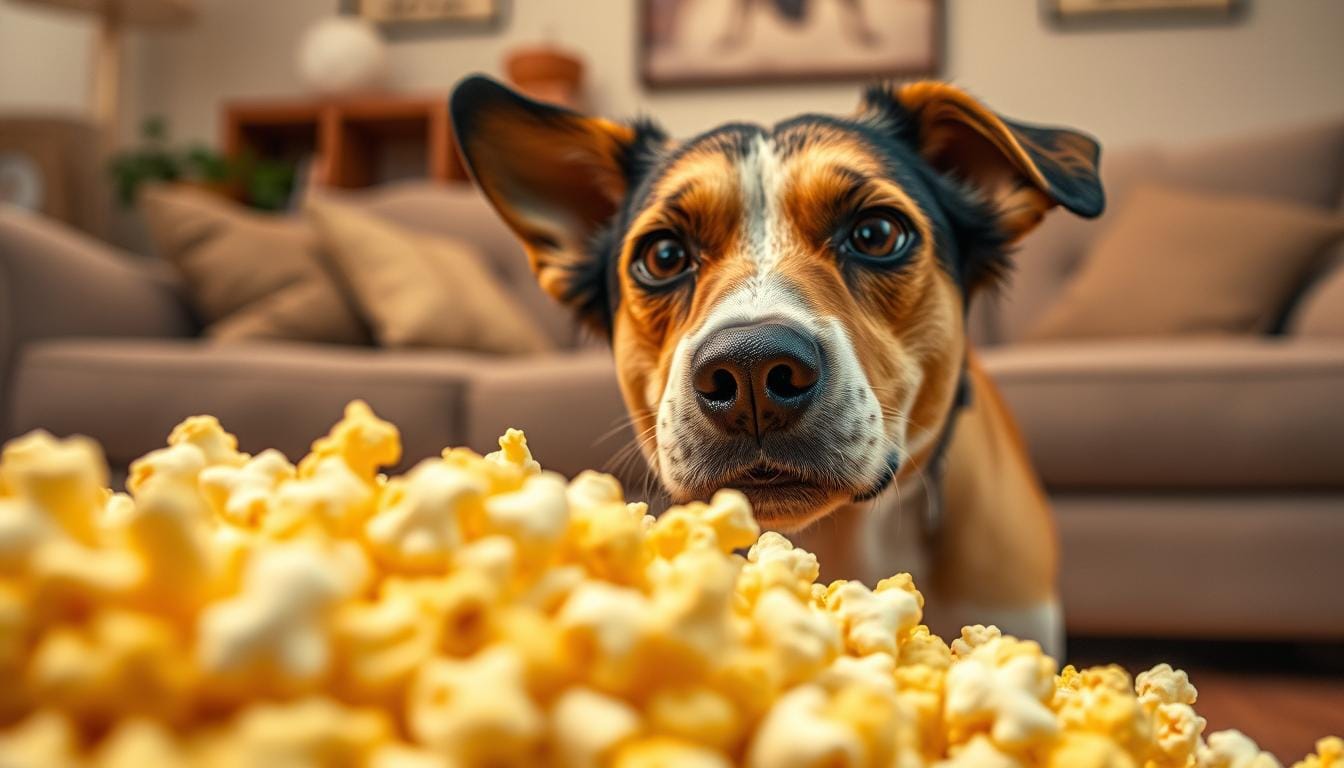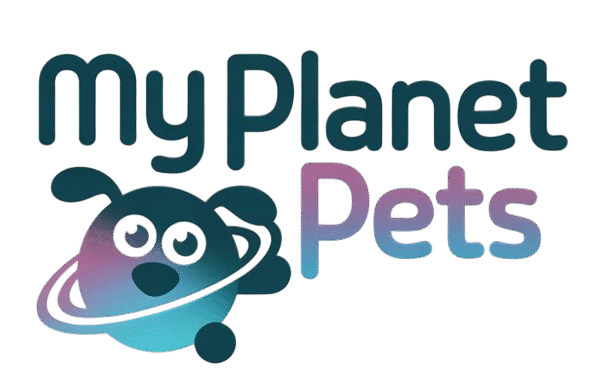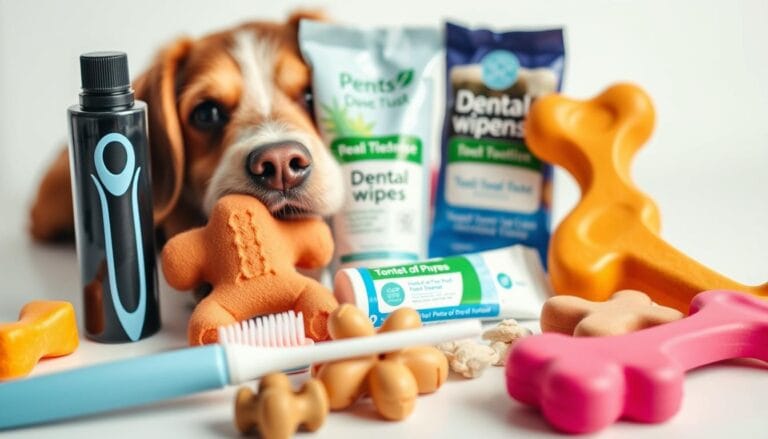Can Dogs Eat Popcorn? 8 Powerful Vet-Approved Tips for Dog Owners

As a pet owner, you’ve likely wondered at some point whether it’s safe to share your favorite snack with your furry friend. The question on many minds is: can dogs eat popcorn?
Feeding popcorn to dogs can be a complex issue, as it depends on several factors, including the preparation method and any additives used. According to veterinary sources, some types of popcorn are safer for dogs than others. Can dogs eat popcorn safely? It ultimately depends on how it’s made and what’s added to it.
In this article, we’ll explore the safety of feeding popcorn to dogs and provide vet-approved tips for pet owners.
Table of Contents
The Relationship Between Dogs and Human Foods
Dogs are frequently attracted to human snacks, raising questions about what they can safely eat. Can dogs eat popcorn? This attraction is largely driven by their sense of smell and taste, making human food like popcorn a tempting treat.
Why Dogs Are Attracted to Our Snacks
Dogs have a highly developed sense of smell that allows them to detect the aroma of human food, including popcorn. Their taste preferences are also geared towards the rich flavors found in many human snacks. This attraction can lead to begging behavior, as dogs associate human food with positive interactions.
Understanding Canine Dietary Needs
Unlike humans, dogs have different nutritional requirements. Their diet should be rich in protein and balanced in terms of fats and carbohydrates. Can dogs eat popcorn without disrupting this balance? Understanding these needs is crucial when considering sharing human food like popcorn. While an occasional piece of plain popcorn is unlikely to harm most dogs, it’s essential to prioritize their specific dietary needs.
Can Dogs Eat Popcorn? The Complete Answer
Can dogs eat popcorn? This is a common concern among pet owners. While popcorn itself is not toxic to dogs, the answer depends on several factors, including the type of popcorn and the quantity consumed.
Plain Popcorn vs. Flavored Varieties
Veterinary advice often suggests that plain, air-popped popcorn is safer for dogs than flavored varieties. Can dogs eat popcorn with additives like salt, butter, or artificial flavors? These ingredients can be harmful to a dog’s health. Plain popcorn, on the other hand, is a simpler snack that can be enjoyed by dogs in moderation.
| Popcorn Type | Safety for Dogs |
|---|---|
| Plain, Air-Popped | Generally Safe |
| Flavored or Buttered | Not Recommended |
Portion Control and Frequency Considerations
Portion control is crucial when it comes to feeding popcorn to dogs. Can dogs eat popcorn regularly without health risks? Overconsumption can lead to digestive issues and other health problems. It’s also important to consider the frequency of popcorn as a treat. Occasional treats are less likely to cause harm, but regular consumption can lead to negative health effects.
“Treats should not make up more than 10% of a dog’s daily calorie intake.”
By understanding the type of popcorn and controlling the portion size, pet owners can make informed decisions about sharing this snack with their dogs.
Nutritional Profile of Popcorn for Canines
Popcorn, a popular human snack, has a unique nutritional profile that can impact canine health in various ways. While it is not a nutritionally complete food for dogs, it does contain some beneficial nutrients.
Beneficial Nutrients in Plain Popcorn
Plain, air-popped popcorn is a good source of fiber, which can aid in canine digestion. It also contains antioxidants and various minerals like magnesium and zinc. Can dogs eat popcorn for its nutritional benefits? These nutrients can contribute to overall health when consumed in moderation.
- Fiber: Supports healthy digestion
- Antioxidants: Help protect against oxidative stress
- Minerals: Magnesium and zinc support various bodily functions
Caloric Content and Weight Management Concerns
One of the primary concerns with feeding popcorn to dogs is its caloric content. Can dogs eat popcorn without risking weight gain? Popcorn is relatively high in calories, and excessive consumption can lead to weight gain. Dog owners should be mindful of portion sizes to avoid contributing to obesity or other weight-related health issues in their pets.
To safely include popcorn in a dog’s diet, it’s crucial to balance its caloric contribution with the dog’s overall dietary needs and activity level.
Potential Dangers of Feeding Popcorn to Dogs
While popcorn might seem like a harmless snack, it poses several risks to canine health. Dogs, being naturally curious and often attracted to human food, may unknowingly be exposed to various hazards when consuming popcorn.
Choking Hazards: Unpopped Kernels and Dental Risks
One of the primary concerns with feeding popcorn to dogs is the risk of choking on unpopped kernels. Can dogs eat popcorn safely if some kernels are unpopped? These hard kernels can become lodged in a dog’s throat or digestive tract, potentially causing serious harm. Additionally, the hard texture of unpopped kernels can damage a dog’s teeth, leading to dental problems.
Harmful Additives: Salt, Butter, and Artificial Flavors
Many types of popcorn are flavored with additives such as salt, butter, and artificial flavors, which can be detrimental to a dog’s health. Can dogs eat popcorn that contains these ingredients? Excessive salt consumption can lead to sodium ion poisoning, while butter and other fatty additives can cause pancreatitis. Artificial flavors may also trigger allergic reactions or other adverse effects.
Digestive Issues and Allergic Reactions
Some dogs may experience digestive issues after consuming popcorn, including diarrhea or stomach discomfort. Can dogs eat popcorn without triggering allergies or sensitivities? Certain ingredients in flavored popcorn can provoke allergic reactions in sensitive dogs. It’s essential for dog owners to monitor their pets closely after introducing popcorn into their diet.
8 Vet-Approved Tips for Safely Feeding Popcorn to Dogs
Can dogs eat popcorn safely? To ensure a healthy snacking experience, dog owners should follow vet-approved tips for feeding popcorn to their pets. These guidelines are designed to minimize risks and maximize the enjoyment of this popular snack.
Tip 1: Choose Air-Popped, Plain Varieties Only
Veterinarians recommend opting for air-popped, plain popcorn to avoid adding unnecessary fats or seasonings that could harm dogs. This type of popcorn is the healthiest option.
Tip 2: Remove All Unpopped Kernels
Unpopped kernels can pose a significant choking hazard or cause dental issues if ingested. Carefully removing these kernels is crucial.
Tip 3: Introduce Popcorn Gradually
When introducing popcorn to a dog’s diet for the first time, it’s essential to do so gradually. Start with a small amount to monitor for any adverse reactions.
Tip 4: Maintain Proper Portion Control
Maintaining proper portion control is vital to prevent overfeeding and potential weight gain. Treats should not exceed 10% of a dog’s daily caloric intake.
Tip 5: Avoid All Seasonings and Additives
Many seasonings and additives commonly used on popcorn are toxic to dogs. Avoid any flavored or topped popcorn to keep your pet safe.
Tip 6: Consider Your Dog’s Size and Health Status
The size and health status of your dog are critical factors in determining whether popcorn is a suitable snack. Larger dogs may be able to handle more popcorn than smaller dogs.
Tip 7: Use as Occasional Treats Only
Popcorn should be considered an occasional treat rather than a regular part of a dog’s diet. This helps maintain a balanced diet and prevents overindulgence.
Tip 8: Monitor for Adverse Reactions
Always monitor for adverse reactions after feeding popcorn to your dog. Symptoms can include digestive issues, allergic reactions, or other health concerns.
By following these vet-approved tips, dog owners can safely include popcorn in their pet’s treat rotation, ensuring a fun and healthy snacking experience.
- Choose air-popped, plain popcorn.
- Remove unpopped kernels.
- Introduce gradually.
- Maintain portion control.
- Avoid seasonings and additives.
- Consider dog’s size and health.
- Use as occasional treats.
- Monitor for adverse reactions.
How Different Popcorn Varieties Affect Dogs
Different types of popcorn can have varying effects on dogs, depending on their ingredients and preparation methods. Can dogs eat popcorn of all kinds? While plain, air-popped popcorn is generally considered safe for dogs in moderation, other varieties can pose significant health risks.
Microwave Popcorn Concerns
Microwave popcorn often contains additives and chemicals that can be harmful to dogs. The bags used for microwaving popcorn are lined with chemicals like perfluorooctanoic acid (PFOA), which can leach into the popcorn during heating. These chemicals have been linked to various health issues in dogs, including cancer and reproductive problems. Additionally, microwave popcorn can contain artificial butter flavorings, such as diacetyl, which can cause respiratory issues in dogs.

Movie Theater Popcorn and Commercial Options
Movie theater popcorn and other commercial popcorn options are often loaded with salt, butter, and other seasonings that can be detrimental to canine health. The high sodium content can lead to electrolyte imbalances, while the fat from butter can cause pancreatitis. Furthermore, some commercial popcorn may contain other harmful ingredients like garlic or onion powder, which belong to the Allium family and can cause anemia in dogs. It’s crucial for dog owners to avoid sharing their movie theater or commercially purchased popcorn with their pets.
By understanding the differences in how various popcorn types affect dogs, pet owners can make informed decisions about what snacks are safe to share with their canine companions.
Age and Breed Considerations for Popcorn Consumption
When it comes to feeding dogs popcorn, age and breed are crucial factors to consider. Dogs of different ages and breeds have unique needs and sensitivities that can affect how they react to treats like popcorn.
Puppies vs. Adult Dogs
Can dogs eat popcorn, including puppies and adults? Puppies, with their developing digestive systems, may be more susceptible to the potential hazards of popcorn, such as choking on kernels or experiencing digestive upset. Adult dogs, while generally more resilient, still require careful consideration regarding the quantity and preparation of popcorn they are given. It’s essential to monitor both puppies and adult dogs for any adverse reactions when introducing popcorn as a treat.
Breed-Specific Sensitivities
Certain breeds may have specific sensitivities or health conditions that can be exacerbated by consuming popcorn. For example, brachycephalic breeds (those with shorter noses) might have a harder time digesting certain foods or may be more prone to choking hazards. Understanding the specific needs and potential health issues of your dog’s breed is vital in making informed decisions about treats like popcorn.
Can Dogs Eat Corn? Understanding the Broader Context
Understanding whether dogs can eat corn requires examining its role in dog food and different forms. Corn is a common ingredient in many commercial dog foods, serving as a source of carbohydrates, fiber, and other nutrients.
Corn as an Ingredient in Dog Food
Corn in dog food is often processed into a form that’s easily digestible for dogs. It’s used in various dog food recipes due to its nutritional benefits and cost-effectiveness. However, the quality of corn used can vary between dog food brands.
Different Forms of Corn and Their Safety
Corn can be fed to dogs in various forms, but not all are safe. Cooked corn, for instance, is generally considered safe, while raw corn on the cob can pose a risk due to its potential to cause intestinal blockage. Other forms, like cornmeal or cornstarch, are typically safe when used appropriately in dog foods.
Healthier Alternatives to Popcorn for Dogs
While popcorn can be a fun snack for humans, it’s essential to consider healthier alternatives for our canine companions. Dogs have different nutritional needs than humans, and some human snacks, including certain types of popcorn, may not be ideal for them.
When looking for alternatives, it’s crucial to choose snacks that are not only tasty but also provide nutritional value or at least don’t harm their health. The good news is that there are many dog-friendly snack options available, both in commercial products and natural foods.
Commercial Dog-Friendly Snacks
Many pet food companies now offer a range of dog-friendly snacks that are designed to be both healthy and enjoyable for dogs. These snacks come in various forms, such as biscuits, jerky, and even snack-sized versions of their regular dog food.
| Snack Type | Nutritional Benefits | Considerations |
|---|---|---|
| Sweet Potato Chews | Rich in fiber and vitamins | May be high in calories |
| Carrot Sticks | Low in calories, high in fiber | May not be as palatable to some dogs |
| Greenies Dental Chews | Promotes dental health | Some dogs may not like the texture |
Natural Food Alternatives
Some dog owners prefer to give their dogs natural food alternatives as snacks. These can include pieces of cooked chicken, carrots, green beans, and apples (without seeds or cores).
“Feeding your dog natural foods can be a healthy alternative to commercial snacks, as long as you’re aware of what foods are safe for canine consumption.” – Pet Nutrition Expert
When choosing natural snacks, it’s vital to ensure they’re safe for dogs. For example, onions, grapes, and chocolate are toxic to dogs and should be avoided entirely.

Signs Your Dog May Have Popcorn-Related Issues
After a dog has eaten popcorn, owners should be on the lookout for signs of related health problems. While popcorn can be a harmless snack when given in moderation, there are potential risks associated with its consumption.
Immediate Warning Signs
Immediate warning signs that a dog may be experiencing popcorn-related issues include choking or difficulty breathing due to unpopped kernels or large pieces of popcorn. Vomiting or diarrhea can also occur, especially if the dog has eaten flavored or buttered popcorn. If you notice any of these symptoms, it’s crucial to seek veterinary attention promptly.
Long-term Health Concerns
Long-term health concerns associated with popcorn consumption in dogs can include digestive issues or allergic reactions to certain ingredients. Regularly feeding popcorn to dogs can lead to weight gain or obesity due to its high caloric content. The following table summarizes potential health concerns:
| Health Concern | Cause | Symptoms |
|---|---|---|
| Choking | Unpopped kernels or large popcorn pieces | Gagging, difficulty breathing |
| Digestive Issues | Flavored or buttered popcorn | Vomiting, diarrhea |
| Obesity | High caloric intake from regular popcorn consumption | Weight gain, lethargy |
Monitoring your dog’s behavior and health after consuming popcorn is essential to prevent or address any potential issues early on.
When to Consult Your Veterinarian About Popcorn Consumption
Knowing when to consult a veterinarian about popcorn can help prevent health issues in dogs. While popcorn can be a harmless snack when given correctly, there are situations where veterinary advice is necessary.
Emergency Situations
In cases where a dog ingests a large amount of popcorn, especially if it’s flavored or contains unpopped kernels, it’s crucial to seek immediate veterinary attention. Symptoms like choking, vomiting, or abdominal pain require urgent care. If your dog shows any of these signs, consult your veterinarian right away.
Routine Dietary Discussions
Even if your dog is healthy, it’s a good idea to discuss your pet’s diet with your veterinarian during routine check-ups. They can provide guidance on safe treats, including popcorn, and help you understand how to incorporate them into your dog’s diet without risking their health. Your veterinarian can offer personalized advice based on your dog’s breed, age, and health status.
Sources:
https://noblevetclinic.com/blog/can-dogs-eat-popcorn-what-you-need-to-know?
https://www.justanswer.com/veterinary/evijf-dogs-eat-popcorn.html?
https://www.chewy.com/education/dog/food-and-nutrition/nutrition-pet-diet-tips-can-dogs-eat-popcorn?
https://hello-mesa.com/blogs/news/can-dogs-eat-popcorn-a-pups-perspective?
https://www.years.com/blogs/nutrition/can-dogs-eat-popcorn?
https://www.petmd.com/dog/nutrition/can-dogs-eat-popcorn?
Conclusion
Pet owners now have a comprehensive understanding of the considerations involved in feeding popcorn to their dogs. The key is to be aware of the potential risks and benefits associated with this popular human snack.
By choosing air-popped, plain popcorn and following the outlined feeding guidelines, dog owners can safely share this treat with their pets. It’s essential to prioritize responsible pet ownership, ensuring that any human food shared with dogs is done so in a way that maintains their overall health and well-being.
Ultimately, the decision to feed dogs popcorn should be made with careful consideration of their individual needs, health status, and dietary requirements. By doing so, pet owners can enjoy sharing this snack with their dogs while keeping them safe and healthy.



